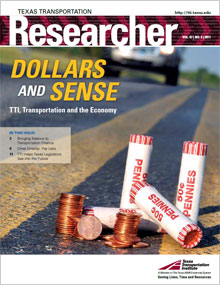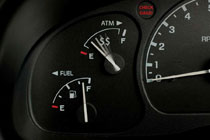For motorists across the country, it feels like history is repeating itself. Recently, average gasoline prices hovered around $4.00 per gallon, just like they did in 2008. And some predictions have prices at the pump heading to $5.00 in 2012.
As a result, commuters are once again contemplating changes in what, or how, they drive. A more economical vehicle is always one option. Other choices for urban dwellers include an increased use of transit or joining a carpool and taking advantage of smarter commuting options like high-occupancy vehicle lanes.
“I suspect that many people are thinking about how they drive,” says Joe Zietsman, head of the Texas Transportation Institute’s (TTI’s) Environment and Air Quality Division. “‘Is this trip really necessary? Can I combine this trip with another? Can I use an alternative mode or share a ride?’”
One thing that Zietsman says most people don’t realize is that they can save money by changing the way they drive. “If you want to save on fuel costs, you can avoid sudden stops and quick accelerations, which burn up a lot of gas,” he says. “Anticipating changes in traffic lights and coasting to stops are great habits to have.”
Zietsman says that studies at TTI and other places show that up to 10 percent of your gas bill can be eliminated just by practicing what he calls eco-driving. Eco-driving involves adopting driving behaviors that can result in reduced emissions and fuel consumption, which saves money and is also good for the environment. Some eco-driving behaviors include:
- Use a “feather foot” on the gas pedal instead of a “lead foot.”
- Avoid tailgating — maintain reasonable following distances.
- Avoid rapid starts and stops, also known as “jack rabbit” driving.
- Drive the prevailing speed between intersections.
- Use cruise control on freeways (except hilly areas).
- Use the air conditioner sparingly for speeds up to 40 mph.
- Avoid idling when possible.
- Get an EZ or TxTag pass if you use toll roads often.
Several other tips to help squeeze more miles to the gallon: check tire pressure on a regular basis, make sure your vehicle is tuned up and don’t carry unnecessary items in your trunk.
Zietsman says that by becoming a more eco-friendly driver, you will use less fuel, save money and also reduce emissions.

